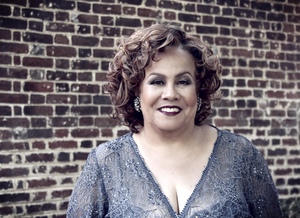The Asheville Lyric Opera‘s “A Taste of Opera” was a sumptuous event chock-full of all the elements which opera-lovers have always associated with the enjoyment of their long-lived art. This superbly enjoyable evening’s worth of pleasure began with everybody’s favorite pastime — the consumption of lots of great food and wine provided by well-known area sponsors, among them The Country Club of Asheville, Roman’s, the Red Stag Grill, The Wine Studio, Bavarian Dining, Kubo’s Japanese Fusion, Amy’s Handmade Truffles, and Vincenzo’s — and concluded with the piece de resistance: a concert showcasing the numerous excellent voices which this twelve-year-old company is proudly able to bring to the stage of the Diana Wortham Theatre.
The entire evening was a welcome revelation to me. I have only recently returned to Asheville after working a few years in Raleigh, and there I have seen many reputedly strong performance organizations fighting to stay alive because of the bad economic times bringing grief to all of us. Sadly, some of these organizations may lose the struggle. I have heard often enough that times have been equally tough on Asheville’s musical organizations, particularly our home-grown opera. But the size of the exuberant crowd during the Saturday-evening food fest and the delighted response of the large (and well-fed) audience to the fine singing during the concert tell me that ALO’s directors and long-time patrons are hanging tough against the quicksand pull of economic difficulty.
It was the singing that brought most joy to my critic’s heart, and I can say with sincerity that the quality and beauty of the voices on the stage were constant from the beginning to the end of the concert. The music, quite wisely chosen by conductor C. Michael Porter, was a parade of hits from all eras of opera’s development, from the days of Handel and Mozart to those of Carlisle Floyd. Much lighter but equally beloved music was chosen from the works of Franz Lehár, and Rodgers and Hammerstein. Everything on the program allowed the singers all the chances they needed to demonstrate the full range of their considerable vocal and dramatic skills. The program was given in memory of the legendary opera singerGiorgio Tozzi (1923-2011), who died of a heart attack in Bloomington, IN, on Friday, June 3. Chances are goof this program would have made him smile in appreciation.
The arias offered by the ladies on the program were splendid representations of the considerable vocal skill of each. As we heard in the opening piece for soprano and chorus, “Placido e il mar,” from Mozart’s Idomeneo, Heather Ferguson’s lyric voice can present some satisfying, expressive vocalism. In other pieces on the program, particularly in the well-known soprano showpiece “O luce di quest’anima” from Donizetti’s Linda di Chamounix, she showed us some satisfying coloratura fireworks. Speaking of coloratura singing brings me to express my deep admiration for the great lyric-coloratura skill and admirable theatrical style of Lisa Williamson in the wonderfully exciting “Měsíčku na nebi hlubokém” from Dvorak’s Rusalka. She can also express to perfection the romantic lyricism of Franz Lehár, as she showed in the latter’s Merry Widow duet, “I Love You So,” which she and baritone David Craig Starkey sang beautifully together. Williamson’s greatest asset, her skill as an actress, is complemented by her great vocal power and expressiveness, all of which she offered the audience in a riveting scene from Floyd’s Susannah. As the heroine she is relentlessly pursued by a supposedly holy man who is not interested in saving her soul. Williamson’s skills were matched by those of bass Daniel Cole in the role of the pursuer.
Two other ladies also deserve high marks for their performances. Beth DuRoy’s excellent soprano voice lent color and rich expression to her aria from Handel’s Alcina and also, with mezzo-soprano Amanda Gardner-Porter, to an exquisitely-sung duet from the same composer’s Giulio Cesare in Egitto. I also single out for excellence the work of Gardner-Porter, whose powerful mezzo soprano voice, with its richness, agility, and great range, brought gloriously alive Rossini’s signal aria, “Non più mesta,” from La Cenerentola. I have not heard a more satisfying mezzo voice in ALO productions or, for that matter, in most other opera venues.
In addition to these fine singers, three men — William Martin, tenor, Daniel Cole, basso cantante, and Philip Haynie, lyric baritone — deserve kudos for their uniformly excellent vocal performances. Of these three, William Martin and Philip Haynie were especially noteworthy. Martin sang the over-performed “Vesta la giubba” of Leoncavallo’s I Pagliacci with tasteful lyrical restraint and supreme vocal control, quite unlike the overly-emotional, tear-soaked dramatics so characteristic of many tenors of the past. Haynie sang with great passion and tenderness the great aria, “Avant de quitter ces lieux,” from Gounod’s Faust, in which the noble soldier Valentin cannot go off to war without beseeching Heaven to protect the honor of his young sister Marguerite, for whose purity he worries. In his performance he revealed a voice of great beauty, range and expressiveness. I have not heard anyone sing this very difficult aria locally, or anywhere else for that matter, who succeeded as well in its performance as Haynie. Finally, Cole, whose superb bass voice conveyed the latent evil of the lonely preacher in Susannah, also portrayed with malignant power Gounod’s essence of evil, Mephistopheles, as he creept into the dreams of the corrupted Faust.
To conclude this review, I commend professional accompanist Virginia McKnight for her excellent playing in support of all the performers, as well as narrator Patricia Neuermann, whose smooth, accurate explanation of all the scenes on stage made them understandable to all members of the audience.











